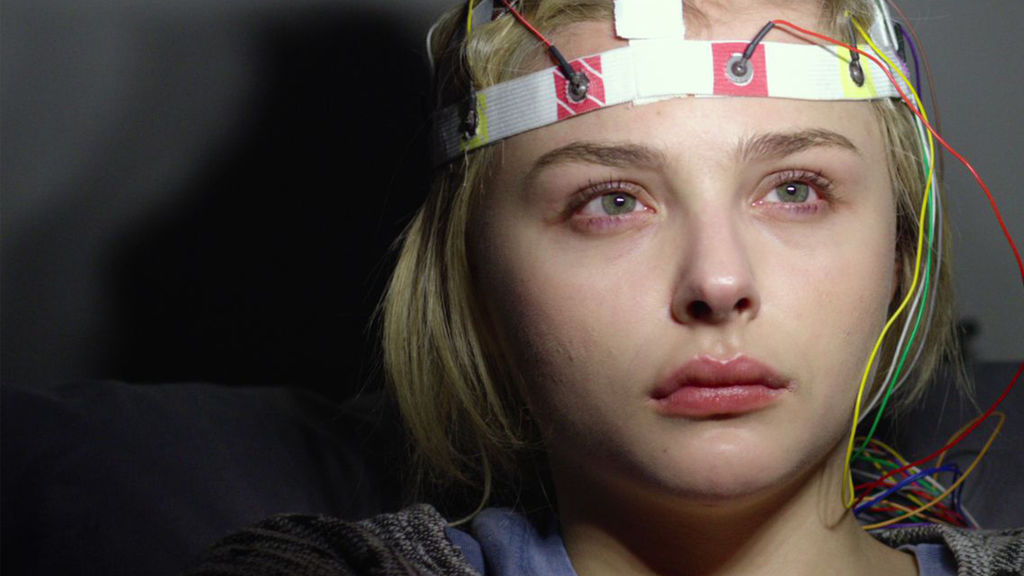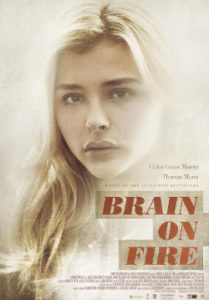

BRAIN ON FIRE
Starring: Chloë Grace Moretz, Thomas Mann, Richard Armitage, Carrie-Anne Moss, Jenny Slate, Tyler Perry
Director: Gerard Barrett
Writer: Gerard Barrett (screenplay), Susannah Cahalan (memoir)
Reviewed by Sidney Morgan
This review CONTAINS SOME SPOILERS.
The human body is a phenomenal piece of evolutionary marvel. Want to move forward? No conscious though needed, yet the electrical stimulus to make sure both legs move while maintaining balance is sent and baring a clumsy or clutzy moment. Voilà, you’re walking. And though incredible advances have been made to understand it, so much is still unknown, especially when it comes to matters of the brain. So when something does go wrong, we are left to look on helplessly at its oft ravaging effects, waiting for an explanation.
Brain on Fire, based on Susannah Cahalan’s memoir Brain on Fire: My Month of Madness stars Chloë Grace Moretz as Susannah. A woman whose life takes a serious stumble as she suddenly begins to experience inexplicable erratic behaviours. She’s a vibrant, young 21-year-old woman who lives in New York City. She’s working at her dream job as a writer for the New York Post. She meets Stephen (Thomas Mann), a young man whose own dream is to become a musician. But her happiness is cut short as she begins to suffer seizures, memory loss, and delusions among other symptoms. What follows is a journey into her condition, which worsens with every passing day. Standing helplessly by her side are her mother and father, who are divorced, as well as her boyfriend, Stephen.

Whether you enjoy the movie depends entirely on the approach, you take watching it. This isn’t a movie about the search for a cure like in Lorenzo’s Oil. Nor is it about alternative ways to make patients feel better as Robin Williams did in Patch Adams. It isn’t about a miracle drug as in Awakenings. There certainly aren’t any supernatural occurrences as in Flatliners. Brain on Fire is about Susannah and her terrifying journey from being a fun, joyful young woman, to a catatonic patient in a hospital. A woman whose life is slowly drifting away due to a lack of proper diagnosis. It’s also about the helplessness of love ones unable to help. They try to support her while fighting a rigid medical system to do more and find the cause of her illness.
The movie is also an indictment against parts of the medical system. When Susannah begins to see her doctor, he’s perplexed as all of her physical signs point to a perfectly healthy young woman. Instead of digging deeper, he simply diagnoses her as lacking sleep and drinking too much (though she tells him specifically she has perhaps one drink per night). He’s “seen this so many times before.” When the parents get involved, he sings them the same song. After all the tests at the hospital, knowing they have no idea what is going on. The team of doctors try to brush her condition away as a psychiatric one. It takes angry parents pushing for the truth for them to finally admit they have no clue what’s wrong with Susannah. How many other people are misdiagnosed?
Chloë Grace Moretz gives a brilliant performance as Susannah. Her metronome like transformation from manic to calm, from joyous to depressed, from grasping her reality to being delusional is well done, and frankly frightening, as this actually happened. She’s been fun to watch in previous movies, and Brain on Fire is no exception. Without this kind of performance, the movie wouldn’t have worked as the supporting cast, which is made up of well-known actors, gave mixed ones.

I was disappointed in the portrayal of Susannah’s family. Richard Armitage is a good actor. I liked him in The Hobbit, as well as in Berlin Station, but portraying a distraught father wasn’t his forte. There was one touching scene between him and Thomas Mann (Stephan) but was better at showing anger and defiance. Carrie-Anne Moss, great in other works, including The Matrix, was too calm and too detached, never really showing the devastating toll this took on her. Perhaps I’m biased because I love The Exorcist. Ellen Burstyn’s outstanding and emotionally charged reaction to her daughter’s complete change in behaviour felt real and believable.
Thomas Mann was good as the ‘stand-by-you-through-thick-and-thin’ boyfriend. Trying to reach her through his music was well done. I was on the fence with Tyler Perry, who was a caricature of J. Jonah Jamison (he was missing the cigar), but also showed kind moments when he worried about Susannah. Standing out among them was Jenny Slate’s performance as Margo, Susannah’s colleague who looks out for her like an older sister would. Her visit to the hospital is one of the rawest scenes in the movie and highlighted the full impact of Susannah’s condition.
Verdict: WATCH IT.
Brain on Fire is a one man’s interpretation of Susannah Cahalan’s rapid descent from vibrant, youthful optimism to a catatonic state. It isn’t the first movie, nor the best, that tries to give viewers a glimpse of some affliction’s impact on its victim and their loved ones. But Chloë Grace Moretz’s performance alone is a reason to watch. Just don’t expect a story about anti-NMDA receptor encephalitis (Susannah’s affliction), nor about its cure. This is Susannah’s story.




One thought on “Movie Review: Brain on Fire (Netflix)”